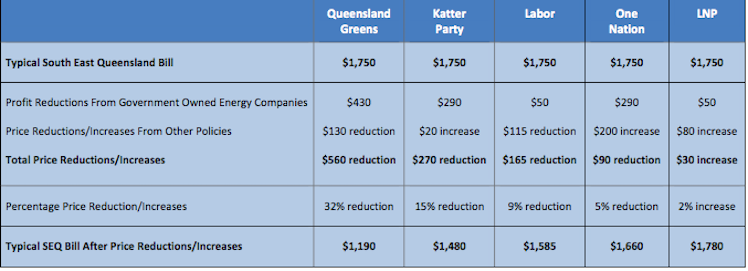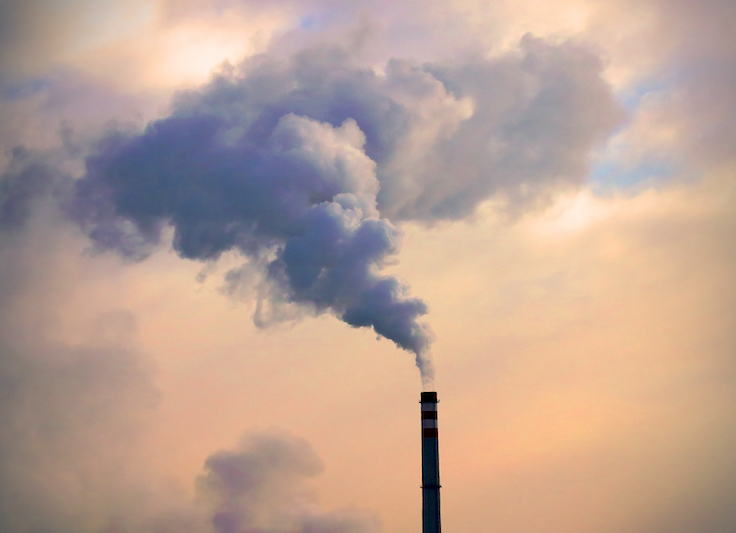Energy analyst and consumer advocate, Hugh Grant, provides an analysis of the Queensland political parties’ electricity policy and their price impacts on household bills — an analysis the Queensland press refuse to run.
This document provides an analysis and critique of the Queensland political parties’ electricity policy announcements as of 19 November 2017. It outlines my estimated annual price impacts of the policies on typical Queensland household bills over the next three years.

Assessment of the price impacts of the Queensland parties’ election policies
It concludes that there would be a wide range of price impacts arising from the Queensland parties’ policies – ranging from an overall reduction of around $600 from the Queensland Greens’ policies, to a price increase of around $30 from the LNP’s policies.
There are a number of factors driving the differing price impacts. However, the majority of the differences arise from two main policy areas:
- How much profits the parties are willing to forego from the government owned energy companies
- The price impacts of the parties’ carbon and renewable energy policies
I remain gobsmacked why this analysis is being ignored by many.
"Come On Courier Mail – How About Some Balanced Reporting?" https://t.co/vRq6Guvk5w … by @hughfgrant on @LinkedIn #qldpol #qldelection #QldVotes2017 @stevenwardill @SteveAustinABC— Sean Barry (@spbarry64) November 22, 2017
1. How much profit are the Queensland parties willing to forego?
The average Queensland household electricity bill of $1,750 contains around $600 of profits — i.e. profits account for around one third of Queenslanders’ electricity bills.
The majority of the profits (around $500) are profits extracted by the Queensland government from the government-owned energy businesses.
The Queensland parties differ significantly regarding how much of the profits they are willing to forego.
The mainstream parties (Labor and LNP) are both addicted to the income they extract from the energy businesses and are only willing to forego around $50 from a typical Queensland household bill — i.e. less than one tenth of the profits the Queensland government is extracting from the energy businesses.
By contrast, the minority parties are promising to forego much higher proportions of the profits.
The Queensland Greens are proposing to revert the government owned energy companies to non-profit public authorities, thereby completely removing their profits from Queenslanders electricity bills — i.e. they would reduce a typical Queensland electricity bill by around $500.
The Katter and One Nation parties would reduce the profits in a typical Queensland household electricity bill by around $300.
And a link to @hughfgrant summary and his analysis document. Can't quite work out why this is not biting in the media, given the emphasis in the campaign?https://t.co/xZtY1Weeae https://t.co/M83qlwnpRF
— Sean Barry (@spbarry64) November 22, 2017
2. The price impacts of the parties’ carbon and renewable energy policies
Another key driver of the different price impacts is the parties’ carbon and renewable energy policies.
Labor and the Queensland Greens have policies that are broadly consistent with Australia’s international emissions reduction commitments (i.e. the Paris Agreement commitments). Their policies also accept the reality that renewable generation is now the lowest cost form of providing new generation capacity.
By contrast, the One Nation and LNP parties are proposing policies that are inconsistent with Australia’s international emissions reduction commitments and that are in denial of the economics of renewable generation.
By scrapping the existing renewable energy targets, the LNP and One Nation are proposing to remove the only policies that are putting downward pressure on generation prices. Both parties are also proposing to intervene in the market by supporting the building of an uneconomic coal power station in North Queensland.
Why We Don't Need A New Coal Power Station in North Queensland #auspol pic.twitter.com/i81PMEkNfC
— hugh grant (@hughfgrant) November 22, 2017
Those policies would have major impacts on Queensland’s future wholesale prices.
Australia’s wholesale prices are highly volatile and very sensitive to political interference and policy uncertainty. Over the past decade, carbon policy uncertainty, policy flip flops and irrational government interventions have discouraged investment in new generation capacity, increasing wholesale electricity prices and introducing unnecessary costs and risks to energy security.
The One Nation and LNP policies would result in ongoing policy chaos, driving further unnecessary increases to Queensland’s wholesale electricity prices and to the wholesale prices in the other states.
Hugh Grant is an energy analyst and consumer advocate and formerly a manager with Queensland’s electricity networks.
You can follow Hugh on Twitter @hughfgrant.
MW's former editor, Sandi was also editor at Independent Australia.
Sandi has conducted corporate investigations, principally into the CSG and media sectors. Sandi holds a Masters degree in Journalism from the University of Melbourne.

